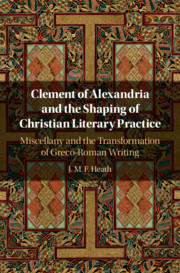 Clement of Alexandria and the Shaping of Christian Literary Practice
Clement of Alexandria and the Shaping of Christian Literary Practice Published online by Cambridge University Press: 16 December 2020
Despite the rapid growth of interest in Classical miscellanies since the 1990s, Clement of Alexandria's miscellanistic form has been consistently sidelined on account of his alleged ‘Christian difference’. But every miscellany is different from every other, and a Christian miscellany is not more thoroughly different just for being Christian. By casting an eye over the history of scholarship, we discover that the trope of ‘Christian difference’ marks the fracturing of relations between Theology and other intellectual disciplines since the nineteenth century. It resonates with anti-Christian stereotypes, which portray Christians as boring and authoritarian users of texts, by contrast with open-minded and playful pagans. In revisiting the nature and extent of Clement’s Christian ‘difference’, we should strive to achieve the Classicist’s eye for literary wit but the Theologian’s sensitivity to theological debate and to integrate the two in studying Clement's experiment with the Classical genre.
To save this book to your Kindle, first ensure [email protected] is added to your Approved Personal Document E-mail List under your Personal Document Settings on the Manage Your Content and Devices page of your Amazon account. Then enter the ‘name’ part of your Kindle email address below. Find out more about saving to your Kindle.
Note you can select to save to either the @free.kindle.com or @kindle.com variations. ‘@free.kindle.com’ emails are free but can only be saved to your device when it is connected to wi-fi. ‘@kindle.com’ emails can be delivered even when you are not connected to wi-fi, but note that service fees apply.
Find out more about the Kindle Personal Document Service.
To save content items to your account, please confirm that you agree to abide by our usage policies. If this is the first time you use this feature, you will be asked to authorise Cambridge Core to connect with your account. Find out more about saving content to Dropbox.
To save content items to your account, please confirm that you agree to abide by our usage policies. If this is the first time you use this feature, you will be asked to authorise Cambridge Core to connect with your account. Find out more about saving content to Google Drive.